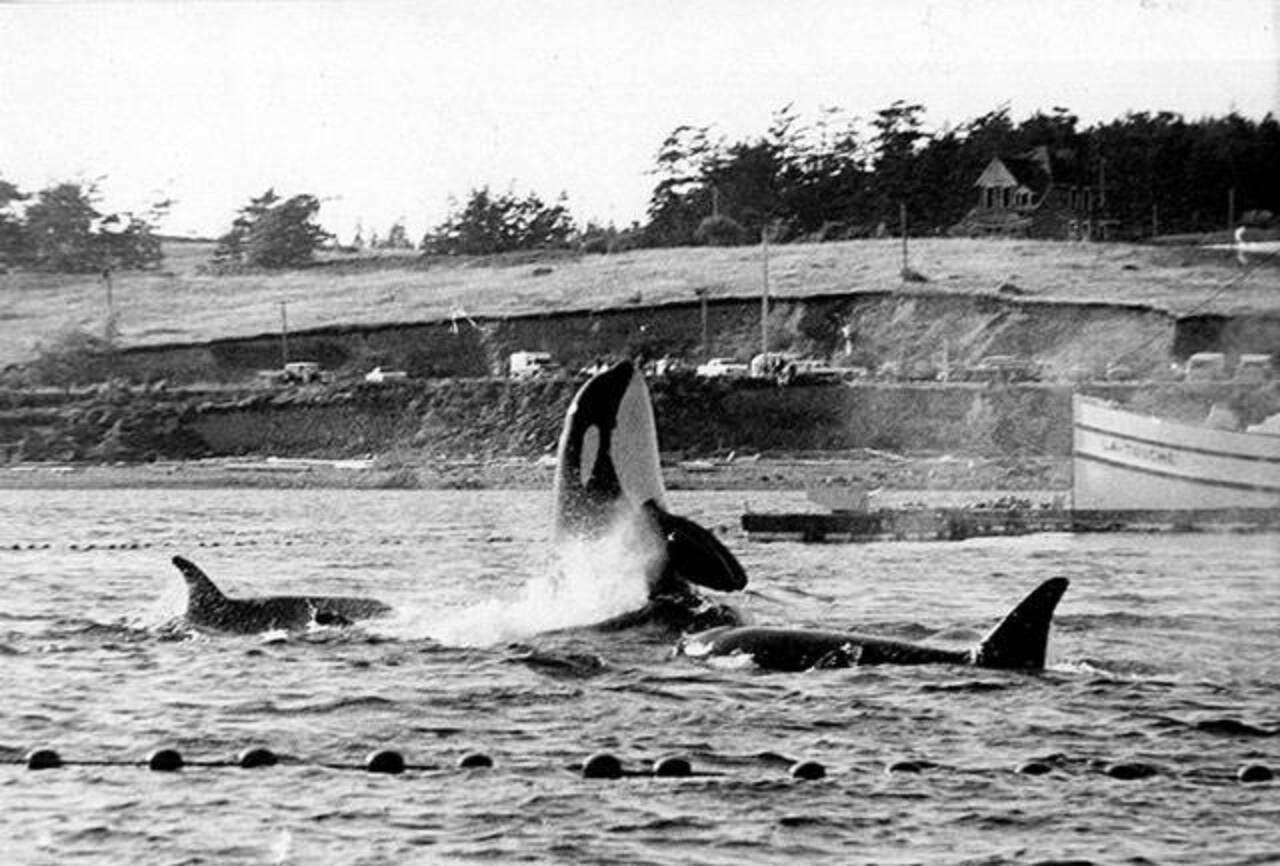By The Herald Editorial Board
It would be nice to think that all is forgiven.
Whether out of forgiveness, fading memory or just simple animal behavior, the Southern Resident orcas’ L pod — one of three resident pods in the Salish Sea — returned last week to Whidbey Island’s Penn Cove, for what’s believed to be the first time in more than 50 years since the inhumane roundups in the summers of 1970 and 1971 of 80 to 100 killer whales and the capture and sale to marine amusement parks of seven orcas.
Among those captured and sold was Tokitae — known more famously as Lolita — who in August last year, after spending her life in captivity in a small Miami, Fla., aquarium tank and trained to perform, died of renal failure, even as plans were made to bring the whale back to her native waters.
Beginning with the capture of Namu in 1965 in a fishing net in British Columbia and continuing through the mid-1970s — even after passage in 1972 of the Marine Mammal Protection Act — orcas were rounded up in the Salish Sea and other waters worldwide. The Penn Cove roundups were brutal, using boats, an airplane, explosives and nets to corral the pod in Penn Cove’s narrow channel, south of Oak Harbor. Four to five orca calves drowned during the capture or were caught in netting left behind after the hunt’s end.
Yet, on Nov. 3 and 4, members of L pod were seen swimming, jumping and slapping their tails in the cove, for the first time since the roundups, reported the Whidbey News-Times’ Luisa Loi. Transient killer whales, which feed on marine mammals rather than the salmon their resident cousins eat, have been seen in Penn Cove; but L pod’s return was notable.
Howard Garrett, co-founder of the Freeland-based Orca Network, said it appeared the whales were there exploring and not hunting salmon, spy-hopping to check out their surroundings.
Garrett and fellow Orca Network co-founder Susan Berta believe that the only whale still alive to have witnessed the roundups — L25, also known as Ocean Sun, and believed to be 96 years old — was with L pod during its return to Penn Cove. Noting no evidence to prove or disprove the notion, both believe the pod’s matriarch — who is thought to be closely related to Tokitae — may have warned the orcas away from the roundups’ site all these years.
Berta believes the pod’s return was made in remembrance of Tokitae, following a ceremony last year by the Lummi Nation to honor the whale the tribe called Sk’aliCh’elh-tenaut; “Sk’aliCh’elh” for the cove where she was captured and “tenaut,” meaning a female relative.
Or the whales’ return may be only a matter of animal behavior. Monika Wieland Shields, co-founder and director of the Orca Behavior Institute, also was present during the pod’s return and conducting research. Wieland Shields chalked up the visit to explorations during the whales’ hunt for chum salmon.
“I think we humans have placed more significance on this event, given how we feel about what happened in Penn Cove than the whales probably do,” she wrote in an email.
But humans placing significance on this return is what is deserved and necessary; in recognition of the inhumanity of the roundups and the captivity of the whales and the duty now to protect an endangered species that as the Salish Sea and Pacific Ocean’s apex predator makes it the key indicator of the health of the waters in which the whales travel.
Of the three Southern Resident pods — J, K and L — only between 72 to 74 orcas remain from a population that numbered nearly 100 in 1995, with recent disappearances of an adult orca, K26, and a calf, L128, recently seen emaciated and being pushed toward a boat of researchers by an adult orca.
Concern for resident orcas resulted in a Washington state-led task force, a report and recommendations in 2019 to aid in the whales’ recovery from a combination of threats, including:
A decline in stocks of chinook salmon that make up about 80 percent of the resident whales’ diet;
Impacts from vessel noise and traffic that hamper the whales’ communication and foraging for prey; and
The presence of toxic chemicals in the ecosystem that effect the health of the whales and their prey.
Efforts are under way to address those and other threats.
Among recent actions, the state Legislature last year passed a new restriction on how closely boats can approach resident orcas, increasing the distance from 400 yards to 1,000 yards; those new rules take effect in January. Earlier this summer, a Bellingham man agreed to pay a $1,000 civil penalty after video showed him moving a 51-foot vessel through a pod of orcas in 2022, when the law then set the limit at 200 years.
And, following a settlement in a lawsuit, the federal Environmental Protection Agency has agreed to water quality standards that will more tightly address the presence of cyanide from mines, metal refining facilities, industries and wastewater sources that are harmful to salmon and orcas.
As well, issues of fish passage through road culverts and by bypassing dams — if not some dams’ eventual removal — must continue to be confronted and addressed.
Your choice: If we’re going to assign significance to the actions of observably intelligent marine mammals, you can take the return of L pod to Penn Cove as a sign of forgiveness, a message of remembrance or as encouraging evidence of a species’ resilience.
But we also should see it as a reminder of our responsibility to return to sustainable health the habitat of salmon, orca and more.
Talk to us
> Give us your news tips.
> Send us a letter to the editor.
> More Herald contact information.

























